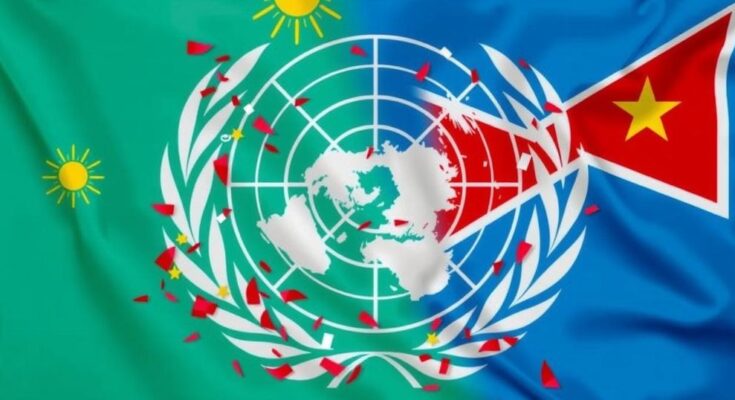Papua New Guinea has declared a boycott of the upcoming UN climate summit, criticizing it as a “waste of time” due to unfulfilled promises from major polluters. Foreign Minister Justin Tkatchenko emphasized that despite being a significant rainforest nation, the country has not seen concrete support in climate negotiations, prompting a shift towards bilateral climate agreements with other nations, particularly Singapore. The decision reflects broader discontent with the effectiveness of COP negotiations among developing nations.
Papua New Guinea has announced its decision to boycott the upcoming United Nations climate summit, categorizing the discussions surrounding climate change as a “waste of time” characterized by empty commitments from major polluting nations. This assertion marks a significant departure, as it is quite uncommon for any government to so outright reject the UN’s principal climate negotiations. Foreign Minister Justin Tkatchenko expressed to AFP that participation seems futile when productive outcomes are lacking, stating, “There is no point going if we are falling asleep because of jet lag because we are not getting anything done.” He criticized large polluters for merely making promises to contribute financially to climate relief, which he believes predominantly benefits consultants rather than leading to tangible results. Papua New Guinea is recognized for hosting one of the globe’s largest expanses of rainforest, which plays a vital role in global carbon absorption. Despite its environmental significance, the nation faces an array of challenges, including severe vulnerability to climate change due to its impoverished status and geographical disposition. Tkatchenko articulated his frustration towards the COP summits, remarking, “COP is a total waste of time,” as he condemned the ongoing cycle of unfulfilled promises and inaction of the previous years. The COP assembly in 2015 established the Paris Agreement, which aims to unify global efforts to mitigate climate change. However, subsequent meetings have seen intensifying criticism, particularly as major polluters are suspected of using their influence to impede meaningful action. Moreover, adaptation funds purportedly designed to assist developing nations have been plagued by bureaucratic delays, hampering their efficacy in addressing urgent climate needs. Civil society movements have previously called for boycotts against COP events, asserting that these gatherings risk serving as a “greenwash” for the unsatisfactory climate efforts of petroleum-exporting states. Papua New Guinea emerges as one of the first nations to vocally declare its intention to entirely abstain from this year’s COP discussions, with Tkatchenko questioning the logic behind investing resources traveling to what he describes as “talkfests”. Notably, he conveyed that the decision to withdraw has received support from other Pacific island nations who have similarly experienced frustration with the UN climate talks, underscoring the urgency of their climate situation. Instead of pursuing global multilateral agreements, Papua New Guinea plans to initiate negotiations for bilateral climate dealings with other nations, including ongoing discussions with Singapore aimed at addressing the impacts of their significant carbon footprints. A recent preparatory meeting for COP29 illustrated the growing discontent surrounding funding agreements for developing nations, with little progress made on establishing a new financing deal to aid these vulnerable countries. As such, Papua New Guinea’s resolution to boycott COP29 delineates a broader challenge facing international climate negotiations, particularly for nations most at risk from climate change effects. In summation, Papua New Guinea has boldly declared its boycott of the forthcoming UN climate summit, citing persistent inaction and unfulfilled promises from major carbon emitters. The island nation’s decision reflects wider frustrations within the Pacific region and highlights a critical need for more efficient and effective climate action strategies. Instead of participating in COP, Papua New Guinea intends to pursue direct agreements to address its environmental concerns, signifying a potential shift in methodology towards tackling the challenges presented by climate change.
The context surrounding Papua New Guinea’s boycott of the UN climate summit is intertwined with a history of dissatisfaction towards the efficacy of international climate negotiations. Positioned as a significant contributor to global biodiversity through its vast rainforests, Papua New Guinea has encountered numerous environmental and economic challenges due to climate change. The nation’s geographical makeup renders it particularly vulnerable to natural disasters exacerbated by climate fluctuations, prompting urgency for actionable solutions. The annual COP summits are designed to facilitate global dialogue and commitment towards collective climate action, yet criticisms have mounted over their effectiveness, with many arguing that these gatherings often result in little more than rhetoric without substantive change. The backdrop of failing to secure adequate funding for climate adaptation strategies and the perception of a slow bureaucratic response have further fueled grievances among developing nations, such as Papua New Guinea.
Papua New Guinea’s clear stance to boycott the upcoming UN climate summit serves as a powerful commentary on the frustrations felt by vulnerable nations regarding climate negotiations. With criticisms directed towards the perceived ineffectiveness of the COP conferences and a call for more direct bilateral engagements, this decision underscores the urgent need for meaningful, actionable climate strategies. Amid growing concerns over climate change’s impact on susceptible regions, Papua New Guinea’s withdrawal could inspire other nations to reassess their roles within the current framework of international climate diplomacy.
Original Source: www.voanews.com




